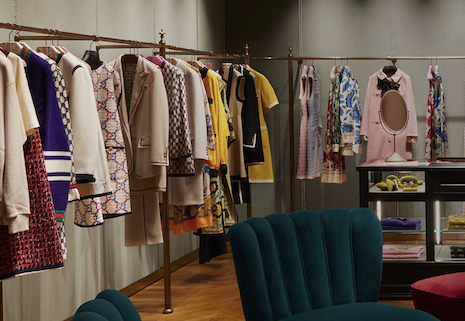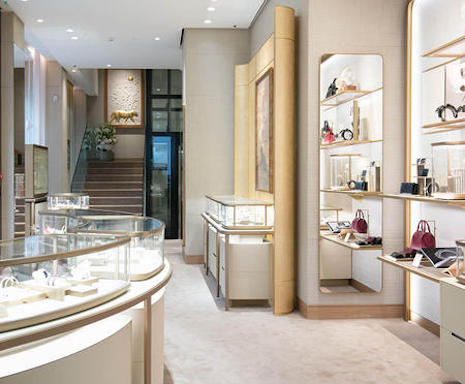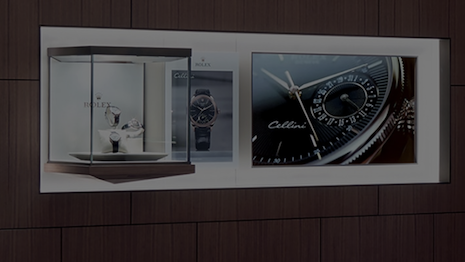Retail stores reopened May 11 in Switzerland and have been performing reasonably well since day one of the new COVID-19-induced reality.
With hand sanitizer at the door, social distancing guidelines spaced out between each customer and limits on shoppers allowed inside, retailers have been welcoming consumers who patiently line up outside of stores to wait their turn. Swiss shoppers are showing up.
“Some will use the term ‘revenge buying,’” said Anthony Schaub, founder at The Consultancy Group, Geneva. “I would complement that with the fact that after a lot of crises, luxury goods have always been very much prized and, in some certain respect, a valuable investment in case of another crisis.
“In addition, the crisis has had various effects on people,” he said. “Some saw their situation worsen, and some saw an opportunity to save money from activities they could not do anymore and are happy to splurge now on something they have been dreaming about.”
 Gucci stores in Zurich limit the number of people inside. Image credit: Gucci
Gucci stores in Zurich limit the number of people inside. Image credit: Gucci
Emotional connections
After being on lockdown for several months, Swiss consumers have been looking to their favorite brands as a way to boost their mood.
“Luxury, in Switzerland or abroad, calls to the emotional side of consumers,” Mr. Schaub said. “Consumers which [sic] have had to deprive themselves from feel-good moments during confinement seek to reward themselves now.
“During the pandemic, we have observed a focus of digital initiatives by all types of brands to keep the conversation going with their customers,” he said. “These range from virtual showrooms, to private Zoom calls, or completely new ecommerce platforms offering home delivery for products previously not available online.
“Despite the large adoption of these initiatives by customers during the confinement, we observe that now that people are allowed to get out, they still prefer, in particular for luxury, to shop in person and experience the brand.”
Still, shopping is not the same as it used to be.
All retail shops from groceries to luxury boutiques have put in place all the safety instructions recommended by health authorities, such as limiting the number of shoppers in a store at the same time and hand sanitizer at every touch point. Not everyone is up for the new world order or feels safe, as global COVID-19 coronavirus cases continue to grow.
“From what I could observe, there is still a limited number of people very hesitant to get out of their houses following the global outbreak," Mr. Schaub said. "However, most of the people are happy to be able to go out again, have a drink on a terrace and go shopping.
“Ecommerce sites already start to see a decline in transactions for goods now available again in traditional retail shops,” he said.
Some consumers are booking private appointments, others are choosing curbside pickup.
“Habits have changed, however, and we now observe brands offering click and collect to avoid waiting time in-store or the ability to digitally book an appointment in-store to ensure that you have an efficient visit and someone readily available to help,” he said.
“The research-online, purchase-offline phenomenon has strengthened during the crisis as people had a lot of time to research online, and now are eager to purchase.”
 Cartier store in Geneva offers private appointments to customers looking to avoid others while shopping. Image credit: Cartier
Cartier store in Geneva offers private appointments to customers looking to avoid others while shopping. Image credit: Cartier
Advertising shifts
Advertising investments dropped by as much as 90 percent in April and May for some companies, leaving the media business struggling.
To survive as consumers went online, luxury brands primarily invested in direct-response advertising and digital marketing.
“This has put an emphasis on brand narrative through storytelling, where in particular luxury brands nurtured and reinforced their good-citizen image by publicizing adequately their supportive actions,” Mr. Schaub said.
“Actions included, for example, producing hydroalcoholic gel or masks on their production lines otherwise dedicated to different products, making generous donations, or ensuring the physical and economical safety of clients and/or employees through extensive programs or financial investments,” he said.
“These efforts were not done for publicity purposes, of course, but the situation made it adequate to speak up about these actions and showcase genuine care and help in concrete terms.”
By sector
As Switzerland reopens slowly but surely, each sector has to look at where it is to carve the path forward.
Carmakers, for instance, likely have high inventory volumes at the moment and will need to re-activate consumers who have spent the last few months considering ecologically responsible choices and the need for a car.
Travel and tourism has been one of the most impacted, and though it will benefit from government grants, the summer will be decisive for many hotels, restaurants, attractions and destinations.
Personal care and services, from beauty salons to gyms, are bouncing back as consumers look to treat themselves after weeks at home.
“The sectors managing well are the ones that took the opportunity of confinement to reinvent themselves and find new ways of meeting their clients’ needs,” Mr. Schaub said. “And within sectors, the gap between the strongest and most adaptable players and the others will grow most probably.
“Luxury stores have found digital platforms are a complementary place to keep the dream alive, and now benefit from these efforts,” he said.
{"ct":"vO85JYNwEeg5ZKbGlnUuaotIcOajJxQLDbwEwe6V5N8mbBbD5zZcgQGJMXCqHC8yyKKc+xjZ3mtPxHShaiOWEdmnYLdaeSyOuUX1K3EvaP1I2O9VUpRfs4Hpyr3oXz9Qe6lNd0FaYJUHa\/lOmqnd1S6OLxrWWhpOtXoVkD\/UKCAVgmdSNBp+d\/Pte\/AwU1y93fFGMoNH61UHdp7\/+hTsmDVd20Ut4kcPtk3f5Wcf+vp4KKjrRWPoobr3EeRJVrFgJnn2fp8r0GAW2zyYPFoghyAsRh987EyRrYf0tVaV8eUUSaiEgjk\/3tjh6loVl9z4ZE8pE\/CtAVy8oRSw8wTfTnccxagmHEY5x0FyfNInGEl4XJUMhi9jq\/wWGELEzuGd8Vec9u7CIhpJLZt2D5ftvaLWZQE1McMZ+UtMNB4AVZCNIu6h0\/XHarLJkJ+JSordSfb4d9x7BHfer32yxAMmeE\/YjtL3QJy29vCcmX9EwPb9L1\/vYsTp3zbWCJRKH5wQmuAI2d2WIcjHYYeSX\/YVobjbI2w4QBcRFKGtSyQOxjZlDGmZ5PGdw2jHGh3j+LUnZIeAZymUs4iDpAuSUGOKN1psdA2+1hemkAM5pooLsKl1UUj4LClo22QBMOAA2kccBw28fi6faO9qP139yy9fatQnXeZyQYzrRP1aRoiOXY0Th9Mve7\/0e8WQ6pVw0+tLTLDX6lehqs0QpQd8dqEgZA6YmhoQIujFbcDI0Y2D9ufBeb8wWVWNw+v7j\/ILXF\/8e6D9otwXmtTja5lX1detpox8aNLUGM7kxKR3SkoJJUYKdYlIdacOPudCvHU4A3OgXt81a82DUdm03k6CcYCR+A0GwWItIJ2WmIkSGZOeiTT7tSYTIQIafV1Wqx4hCjt9VgECDpQbR06fB1nBozWTm2ZZbo\/VBySvBjmvnWsujcoMY9nefc9IFAhcb1Bh9lFfLIRGqSUMMNC1sp3u+Hseu5imbAESkF9e1M05upz8koMdwUbmOv0b9yjb9FgW2geN6eDLVaQEEadsJ0Fny3OMZV8VtYWZZAVZg5gzgGVgFT0i15LgYyv1yRD8\/7XGxEhnK7+VILLv8Ph6PK\/pFGeX7keMYnbKOW8DNo9WD8uakm4qKxTtvpQEdYGCSPvHUE4d+BB8KEAbVxk08YAzxeecwneSLKtcq0sbOJDCpzwYNrKXik\/5yIhtN+wapNCklxMX7s7a8ZKkIRQLBMgSiYjOSaeXVU2cFErMbzChUusVUKY4enwILqq4SFP\/dhsJC4l2NQcOqCqmyU6g1CI7jYd3qESt5TYjXYXUPUdKiX3MVOefymdwUFiNoamNmgeeUvMEttWTlkmL+XmKLEgXWTCNFaOnoiv+okCiznYkdOJWWr+wJlaAK\/01wodSDM2N2BtyI7nkEhIvHLk4CioVCyHJkYqULv8ID0ijtJOmY6VvnBP0RUXWjoL+7KXX8ZZYQJpZwgGjpBoxGwVnHXARUoiJtIvDdyiV88zq8i5Ynstduxi93t9jsmo8V2qeMv7JdgMbehZJ7FIt0+B4x5+cZk3yMWrR4lcSaE6tyg5vUxRa2te+B\/l85TjbOFKctuCntEU7auGOwl8ecFLE1peEU6hQ2I2oFBYfoSg03xMpqT2ocqD2s6fWezCiIRMNbVrjd8wBiyCpm7SHQGJNWjxU42QArChmA0WSlJ9QSPJxrZ43VvS7GilylRQJv7XBDbopqofQuxnenesDVPJfgcYALcYT0u\/dGtuS7lw3rTp8wfd+tiNRKE7IfyZRyiijabjYDPAiTJ59bE8TuXglX5wja3SbmiiXPoPV9I3ecA6cs7kanO7Z1Fx6mEOVotrObFTHe52QccgyR+FyXShuqOQZLxUSawF1oq03wHsyf00AMDaHTzGKEcEyUmVhwApGrTOrNKXn0hPXRHUNn6ur5y551y26RgnTZbgIvAPqD2uaA2CY0BzAGdgm1LzGUFFcuVHlEtXUn9UDEzJCPvI1u074fg+Tp3ZU4zBNEKeP2wQPAOnz0lNigRfw70U2E8ikS1Qb\/d67BdjwyuB9BQm8hbADBsCDtZmOK423PkVT2Pc7K5xKMkqTBmhvQQdHb6gxcS\/KAG\/IsckLCHcjJATwe\/n3R0h9+ARTbjzreY5CSfHA19QxFUVMxzSNVfzxslLkLNpSazzEfD4+A0pLaT76whyEpURVKEwCZdZg0lDcdea3KMd4tJTs5ZhgfsUqWZU2mlGAuoMFmSVNRJI\/nliJNa71Kew7HG3Cqv98OhkcXA9irRn5aHxqqhmLxXBrQjvwRhdILo9uZ\/Ixc\/VUkZgDM80G5oYC9yD8qHz55fqLIcaR3\/A8eedo\/5nR+MulVO3wN\/8Sxti+lGRZyu+c+5gIcpbk9NqSMTgnZ3LwVnTF9S7DfJg3Zdj6\/9nna+C80ewZtulNHO9K+ifw5Xxa8funfEJxNMWwGxXFO4uSgRFr6T0VykjvrQ4Emt90vBEKITtGI7R2z5n33SxQhRtbomN4LxaFicV75eALpufcMYH37fUc3trJlyVT6cvHFnVJw495Jw4yNEOdyP43lSajPpKySB5UUJf1OyVd0FEomUF3pAHcp2+9g7UX4v16LVQVwwXelhrslzdeWSAaJIY8ubEANHEbchhkB4RJa+xbvlqUN4WBVzxqQae5lYeDoaloOujGSLFuIe6oABp1MevRlznhWi16pY\/FNtw36os\/+FlmQrWVGwidKXnvsQ3YUdGidbZ7MQ7uDJr8GpBw5BaneLmV\/hC9XxoTOn3Kv++w+6dtLHxofahGwC0n3Vyqjt+m2wDWwtGfcR+VtI3VOdm5FjdcIt54QGbUxMpE6VLKPbOvZEYLTXJ1VrOC5JsX1q1TBudSbokOInhTgjl16zd7\/tdDfTo9hkIKCd5SEGDC6L13\/lPy4nroEWT3yE6k4u1TFQRDZn9D+8YRn\/vC617H6gMMaQsiiUKjr7rVj4OO2tpUY21he\/GXlhaMDFyysDqgZMGabxcUp+3cy1GanrLEZRKXq0gLSvaTgcfLDrvFCPTfkx77X\/4O8RxD3ZMgGTZVGG7KzUS3L1AG73xnKGdd37ML2ZdPKt6KTPvPUFTpFF\/b9n5oVomoR1JCFzGg6lP49CO72qDRTguZKUhqhwYNFGLEaqdiLMVWPmUZoOk37r638edVQHSirz8UMMSI773HOYQR9FnS\/PkLkMMoNSXIaFYP4FHpIToi7o1YISRBGIebzZ6MLl1MbtOeCc3YTJ0OnntrAM8ygsqlz\/xbf2MiLBiQyfDqEheeTcRXY7+QGM\/7MzEKRN5M+NgB4N7AVCC6Z4b9WI+zo9IC38UCxpaSJ26cYcFWiNJcINCc2BDPqXdpMVh6Id55MU1zO1z9\/A8z6oUyL41l4BeGj\/JGJefr609+ERnX1jROVOk4bWmLDFXN6EAia42PVrJv393W47qMLLJhNGXYVfCRxQN\/Rkm9xqfVlNIxlxd5HHSkrxXDQdA+3M0+i+647N0r7rhxcfB1qnwTLCS\/Aahfd\/4M4KBCJvgmWq9Bl5nR3pbgCxSfe\/OsomQmyceyiBSawGnQRrcz+BitLCq1Fb\/vlKru+KwWTOcdpajUjw8h55UQBLXCX6LiOS5lVjWaT2CFpydK9pSKMFyRjNoOtqj1OV+QFSzWfnJstSkEM6mI0qlFAJF1X5vBGIrWUUyt8NIKWuSMau1ImHJAJqumIX504zJeG9MroENC\/c2gt\/tb5iHs5CJqftq6wknX0k3NxguuAH5I\/KQWnUMOBPCH2ogl+L+DvEmPW7KNttrlPus32H0fkA8x+Xmq8Fphy6h9BPI1L\/2JC8EIDEZqY42HUPnOACQlGsEG1OHMSO4mgjvKTIr2c1v3DxLR5kGdJ34MT+BV7tzNfvKFbjk8mIZDb1DVlELpd0MUU0Nntuzr58odsKEitlRK3IcUnw8fAHi6jxSpdIYL4oY4uoVa9Mn0CnGpOodYfGzoU1jX7AqoQ6DfxnU1cU9XLmhrr81Xs6Aevh84xbu8ObWCCls6uSdZCaZ05QGC47qevtU+xxwCj5VDeoGIJjuYXGVHuCmm+Pjs6c5YFbWhu5XJ8VxADswKW\/F7T+PMH8dLomsB4FPxGFy3VeUt9pCBkjZOkvGhYjdeVLW5Sx9FiUX5i6VmWMY2GSK+L\/WpZ21ddN9X6y86plHkzAD\/ND1qtGN9Hn7zCG5Mm96b0jyVMQPn6+LX5hxi9HzzJzOfIoGma1t3iN0+5Chhp\/RJiFV5MmnDHcb9U4eeNYDZ74zgHZt9Xh06KLeIqckzQZ9JF+KC7bidHPGGFtDmYkqHqsaBg1QMetkvIjoa4nJQUAk1FpnxnlN5+sk+UG2roTTNFsgajfm8Y7MK4J+zQxLKk7MyUHElQYH0nji11iptHFhYPZ+W48d2ZsKTegD4Zihp0NdCinZR7rXrZA+DkI7JFgY0D25WfuMut24y7cIQdXQqEPrUFMwBqCvYzJzbG+yZV9ymnLxWqz9K0cY59VHHcgpwHzu3dFZ25nFLocQq2Yni988Qb2RbPImiNl1bwY16Wp5GpU+BTTeLaXJp45Ro4T2rQCj9xQ2TZDNXmKOwmn06MccSddvQ8lCSAUjX2f0pRe4UFyKNu3BT47tVhcPBGvNsWxc+sdiZhVgiP31r4Lv\/vORVKKAp7OCEJqetDRhTgDe19rKbSGw4SInAIo6O3xYqi9mZmrkjV1nymXrc\/E0gn2Hxj2QMv\/jsrRbvQw4IoNesiad+ZUCBUyou6WBXqNRp0KnJtsmAuB3Ymm0+RcrnTDhHmj11hWJm0DcO7FBpoK1Dk069l6V9zvxhHxyp+t5CsXmYg\/CPf0UdxRZPzgHRTF5mq6h3nbFYeHqWPRq5CsTz0heOK7xx+ZhlW+H+7q8X0q6gwH6pREUD42eRqOZ8ElBR2e8V\/CIFhtCWbthNZTZc6LDzmp6qxL4R3YLe7XKJCDCCIzYGsmTFZNOlR00IO8dFVXBw73GdURRyBJybIn+UVw8ltKNmlPdOdCm9bXZFBtc5wOB+Wlkppu7OYFtf+tyRlYONkOiKiCGMbGDZhh3A9OLMYnZONVDkBwOTZV5b6T6dEv1gcQJQkouyAS1SLfL5Cfwp3JqNf36e\/qiPkTRZn6EPCV9bI8d+wl4S\/4XufKkmKbDyzUFpKrCbPGFjg8bl+t0KYkGgj1Glu485EOrN0svItTkvfcpZllbkovgCtE2PTjIwQLqgSBhJXn+EhGPs2\/eOeLE9cRMagtoeehU2S2rQXM+Rf8GYhAsN6zxj4VrInOqAku+fagOQZ99AvAubUl46+rNJi1kZWH5ms85YgJfHxg0EHRyqp+cvBUF2asrA5e8+77Wdl2fzzriVjIS17KsjIYlmj0+8zOP0ez0JP4Dvbo1C6mbONZbOGMV2nMz6X755HlxxeJdfnN8K8v7U42Yu6jUy08M46WHMwPadIjo3SyWoXK34utc\/cQ+aWY3RrZQuMBSgHAyF2g17GI1l0xv13JL3V1ZHSKAHDIh65v1Spt7\/sssdVRkffiLnudmlKW37qNndavDmx6Pq4MDFg0Vxzs\/PF2zCoJsgg3TwACW3QKle3N+m7q8bARAB2hseLHIAjX0oYJgLZ94svFrqRkSrhvUO8LdUuLSdmIMUFcrrwLVLYa6qTjWLgnnbqQzTzaim2XlIc0eHcg2d7djBvW2ho3jpFknJYWj9+Y28EkFe9RoZcGfHZggBagfKFQZbtlEw+a57OZX8hYrW8oPXebgVjYv0vLv3FR7PC6wZkrptBmK5o0E\/jvYg5g5gmvTaA\/NaprlvAmzL3aHAV\/8+\/dxOqimgdrSayeEqwVhRnv5AH1vvs4xqai39m+DHoLZvQA1IEvouRPGFxfB8acAfTfhHfDcLDu8KCixgNXPz0eHZPMzakYYny5N69uYFQnbVUcbnwVYw4His2bWPt5LF+tYcW2\/3oZHVqhkJ6ss6upr37i4my5uCt2NuGaTj2BnonTTwANQKlpUk7T3dI\/wHCJVCR9VoUSk+IUcyWc4ZMZ623PnAqIt22b2gvLjQ1r3gBcClkMrJcVka8dOKq8pc2GPhwmimyJdZ6MhVT\/gcCEvXNfXSX3mLN\/oAKVS\/jQcjN5xCKeu23DO6DQp7M6d1osd6yJ9geIRHEBR400PJrJYX5Ba2mjBEvk45FFR7ZZ+sfBZaIHDTvOyTbFWqLmdm5zvVwFm\/qGZyQfmMjDpPAF8RrPHMjy+gNhV4XN43pBeWS9yH4rWT1mhZio0RlSbEFWNFIgpmGOlcdDIcpxifJjZbh9yReB1IphFoPOGzGx24SKBdC41c0cobHiNodS2Wj\/l7eNPGvQS9JYOx9wKcrtDTF1u7L9f7AWqQNMrRfYYf+AEeS+AB6VK4x89bq3j79\/DDiCq0JH9WQpBg4Whxjw3mEQ0WRuuzrvE+r9cPW6g+CEdDq4ncDUPsmhjWC62g7wx3m\/xUzTXjyGKxwux6mGRcAD1HL23nFNVa3ePND2rKLo3r\/rY9NZT4oBP4KfGLOgow4k4TH1H6sfZdszNfOr99aRbaSlAxJuRE4T9lcVdK1bvxMcICSzNHqS9fyZ4otNO23tea\/yiUX2iDtyZElJ0+wnBNISbXCngBY7RrL6rDLfbyE5GKm+S6+049BmvD4TfNgyZytsHcysSIfWJtqc\/Ur6FijPBJFoFnq5NlS3HaCV507W8l+h+bH\/zPsB3rpwloTA8pU0Ufhuzj02f1ckhcFkwoQDiUgrh27ynQmZu4JpNPeRySSo3yXke0SCp7F\/+zxmIZD9j1Bj1qM4QA2V8Bpl5MUaM5TxRCKXlOgSb9TKTBzk8iynkOU99plahE\/wdF086ahc27CpmKdbKTvFi1mN\/4hNERTtfWsk5GA2r6o3qAIvyZw+oFsjoGiHqzrXip27JSmVLPyGGwg3ms9flmpAZkOVDsfjCLzQbmI5rB5KCC2mVd2yP9ZC1sVBAtiIqAbliojXcJ8AaUkGLRvd4+Mj8k\/G0\/qqpDl\/bgPkEq4kJxAX26e1MK3SKnlzt1oqIY7iV4WzlS8lFcoDIxTZ9JJ7diclSYZMxg+z9gSbfPN3bCTDSICda+q4UsHGekwsWlpLj7YGNFl5gSqnd8mQtrQPYpFiysumDdg2WHv2miOlarwcIulFzX5cpAd9KdmHR+WA6gPSypoDGVIlQeva6W4j+Y27yrGV0nU1V2nTITrVvgO\/Tvos9wVmIfmMbhrMqE5qbh4mTOp4wCq1qpVPzmNTPcrIHeHyHHwZfonGceL2F4RHlyRHXs3DrDfWCBRUTzYUi8FHQSf\/ll6WxvWMXKSYPFcbyXjR101Ya7c1n7e5mE\/Q9GlZpVLhNLB1Ja215ORxpswdfAtpIvlUjExLvC31u5zEGJ7zJHWimMKy\/UVVWznG5wM\/tPfmGOJ70AsPtOZkEWQ3x\/QM6lW5O+nc9K6TYQ30\/pW9dBEjmtD4jo7ExseSj2XWdUfV4wEOVDZz5xZQ4w803VTj1HKxdgbqmqEGeVaObEcW\/nq8\/6GZNoeV2se784dCYq5bno8Gpeo3NKmPW7dOITY26SrmgbkZe8Sh1Kq\/Xq7IA3wVhRw1\/p\/bInZs4mkKbf2wizxKQvTpmbiAAyz0EBwEDoEyJ9LkBmsl64YVzXbbGJldBJ5kS+\/Yr5vPbkRWp1sO9tiY9wIgeNmUwPBfwwtt4CIHTNWEnk5gsQXYg8QAa2072uS1RTykWHNJXN96ec5oH\/rlm\/ybG5yYyqruLYjWwbzQWNPfULeM1CCOMZFWzBnlOSkZ9nv4tOef33sIL2LXgsDVE9JfWdLz+3RutLwfXZvuIaOunvIXRDotkWtUZcNkl84d97UQXeAMGW098Oeg4is+vVOYRKebtelwxw1ubc8AwrXbU5yTGSSD+OTYiGnzRGstpHXScRDfpuaQ0g4Bo29xXkBWCRyqJeQ87f4XsShIT7batEd4a7wlITnKjz8X8jeK03cG+vStyDvh2jH5EO2KAFTg4dwsp0xfxAH8LSrCif\/AsDniZx68Fj17KG58uEZO6eKOmXhrUJ1hdbe4NzqlqSnEkKJn1ysDAibNlWvb6rI4gZgUi4rrOf6c\/R5AHsq02dzgwxDvhD6UFHoiCJpLYJ3d1iftsqKk9CuBOd7P2+tDpwXEGINmmyN7OfEo2fZHq\/59rwIhqC2mIhT0K2IR2Ps8j6JVEmrNhOXPJjsSizJI\/4gG8Qsgz\/iKVnml4qUBQPj3j9pr24pOLBHaeQceLGO0KRHGDtT5AWP8XPJQGh5o0sOEjdPqNTDKkye7Igxi7\/PEE7xNh0GNetH93irdW+73s6iBF6RYqeTTAPRYj0x46rkgb5HYxRKDuPzvIM3Isp4xqV7H29gkYtGjEbGtyhI0p\/5y9lntmOut4adr4upL5sdOIOMHhu3cxN8UyJaDUCX8Tmg4t4oWZ5KMb8unuL4AdxuIgnKqfgtqk1qBLGIeZBCweaLQ4ZFQIJIxDDnkVftJxrSx1xGB+ww0J9+0QaGiDd8ghd87c6ZesKZW1phXbYUwuB\/biQ5IsYd\/gCtZaRynt8SIPW6exnhaXfq6m6i2KKWLnB4FCLq\/K70CGfX2vb3pMCflzXuO9eblaxLOFDOPDcSfzqjk4TF4\/4BpNkKWkoe86IVahE3ItswHTtJW0lK83\/QpKAwrdoD9m4uDInQC72TTuP7cGK5um1suyuos8oQMTD0C0WESS4S8wRA17Us5mSSiCnLCP3+sEnI7vweRkoTr0S95tSf08JSa4t2IQ59kCNCMew8w+tWa4I\/bFpFLI5J6fqkW3OXSMQ34umL3Upk+3rUFsjHLuyjWEYtf609vDQv\/K9XbEsDshGrkyY5g4x2RRG3momJe65dEmrFwMrTUanRuvzsDivhm7nFeXJqVSgPLaVcwJZdLD0xrZI7QxfWqG1HoIaS\/kNtAwBpJJnoQasq1OA5+EVbxUREsLF2vP6JgrcZL5bZouITNnXuI34zXRbfTEAbDfZo9TJr04Q54H3s+W9qDO7olW9ojBzDcCs3hlCY8e8YE+MlyT0zjMTwcEFUJKE4yaCArsdVdytK84sH6V26L9DQYfMX0\/mpXc7DDWS9Z5CBSb+bnN6oCFt3IXkgleu71ypbkOtIVLMSlWI8HjWpUWDdLRjX6MKH1d2qQ\/YMhmB4nZD2Z6Spf\/TE\/vudDgtVLyOHD85tCfub4KtlSFqmLfLCnWiVkR\/AO4YXcnCgfxcURnRY6nEXLLijv3qzn1MW85bS3ENJJ1+sybMKZarZVP6UfFrXi\/EDRjffkD6P17f7dJMRiFMsnkbt9cT5TAdErlPIIq\/mqpEU3\/IX+zxG8SOR8+e1dRjlgX44B21U1vtxhx\/I5f43IxVEw1LG+0AcjMQAObDhiNHK2oXDQg=","iv":"ec3a07765b69b07aadf592e561ae5194","s":"fdb370ae8d82f1a3"}

 Rolex stores display watches and offer private shopping experiences. Image credit: Rolex
Rolex stores display watches and offer private shopping experiences. Image credit: Rolex
 Gucci stores in Zurich limit the number of people inside. Image credit: Gucci
Gucci stores in Zurich limit the number of people inside. Image credit: Gucci Cartier store in Geneva offers private appointments to customers looking to avoid others while shopping. Image credit: Cartier
Cartier store in Geneva offers private appointments to customers looking to avoid others while shopping. Image credit: Cartier